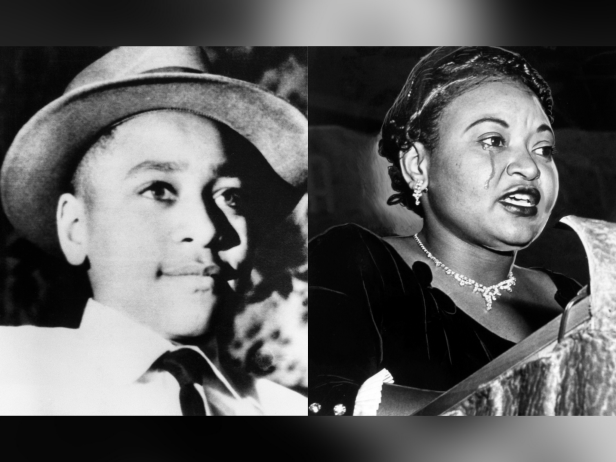5 Things to Know About The 1955 Murder Of Emmett Till
The Black teenager was murdered by two white men in Money, Mississippi, in August 1955 after a white woman accused him of making a pass at her in a grocery store.

Bettmann/Afro Newspaper/Gado/Getty Images
(L-R) Young Emmett Till, and Mamie Bradley, mother of lynched teenager Emmett Till

Fourteen-year-old Till was spending part of the summer of 1955 with his extended family in Money, Mississippi, a rural community about 100 miles north of Jackson when Carolyn Bryant Donham, a 20-year-old white woman accused him of whistling at her on August 24. He was tracked down and killed by Bryant Donham’s relatives four days later.
Till was only visiting Mississippi when he was murdered
The teen was with family in Money during the summer of 1955, though he lived on the south side of Chicago with his mother. Till’s mother, Mamie, had reportedly warned him to keep his head down in the Jim Crow-era south. The day he was accused of flirting with Bryant Donham, Till was reportedly dared by his cousins to ask her on a date. The woman later told her husband that Till whistled at her and grabbed her while making lewd suggestions. That accusation led to his murder four days later.
In a heartbreaking coincidence, Till’s father, Louis, had been executed in Italy 10 years earlier while serving in a segregated Army unit in WWII. The elder Till was accused of raping two Italian women and murding a third, according to ABC News. Louis Till’s guilt is disputed.
Till’s killers confessed but could not be tried again due to double jeopardy
Roy Bryant, Carolyn’s husband, and JW Milam, Roy’s half brother, went to the home where Till was staying on August 28 and abducted him. The men beat Till and took him to the bank of the Tallahatchie River where he was shot in the head before they tied a cotton gin fan around the teen’s neck and threw his body into the river.
A month later, the killers were acquitted of murder by an all-white jury and went on to confess details of the crime to Look Magazine the next year. Because they had already been acquitted of the murder, they could not be tried again for Till’s murder despite the confession.
Till’s death was the de facto launch to the Civil Rights era in America
While Mississippi authorities wanted to bury Till quickly, his mother insisted his body be sent home to Chicago. When she saw the extent of his injuries, she insisted that his funeral be open-casket so mourners could see the horrors he had suffered.
Photos of Till in his casket and his funeral were printed in Jet Magazine, a publication primarily for Black audiences, and the photos were circulated around the world. The crime launched the Civil Rights movement. Just over three months later, in December 1955, Rosa Parks refused to give up her seat on a Montgomery, Alabama bus. On the eighth anniversary of Till’s death, Martin Luther King Jr gave his famous “I Have a Dream” speech in Washington, DC.
A 2017 book about the case launched a new investigation from the US Department of Justice
A Duke University professor named Timothy Tyson documented Till’s story in his book, The Blood of EmmettEmmitt Till. Tyson was able to find a transcript of the 1955 trial, and he tracked down Till’s accuser, who reportedly told Tyson that Till had never grabbed her in the store that August day. In 2018, The Department of Justice announced it had new information in the case and reopened its investigation, though it declined to say exactly what that new information was. The case was closed again in December 2021 without any new charges being filed.
Till was posthumously awarded the Congressional Gold Medal and has a federal civil rights law named after him
The Emmett Till Unsolved Civil Rights Crime Act became law in 2007 and allows for the “sustained, well-coordinated, and well-funded effort to investigate and prosecute racially motivated murders that occurred on or before December 31, 1969.” The 2018 reinvestigation of his case was authorized under the law named for him.
In January 2022, Till and his mother were posthumously awarded the Congressional Gold Medal in recognition of how Till’s death and Mamie’s lifelong activism pushed civil rights initiatives forward. The bipartisan bill to bestow the honor on the mother-son duo was introduced by Sen. Corey Booker (D-New Jersey) and Sen. Richard Burr (R-North Carolina).
In April 2023, Carolyn Bryant Donham died at age 88 in Louisiana.







![Nancy Anderson, 19, [main] was stabbed to death on Jan. 7, 1972. 50 years later, Tudor Chirila Jr. [inset] has now been arrested for her murder.](http://investigationdiscovery.sndimg.com/content/dam/images/investigationdiscovery/crimefeed/legacy/2022/09/washoe-county-jail-tudor-chirila-jr-honolulu-police-department-nancy-anderson-09202022.png.rend.hgtvcom.231.174.suffix/1663700815993.png)

